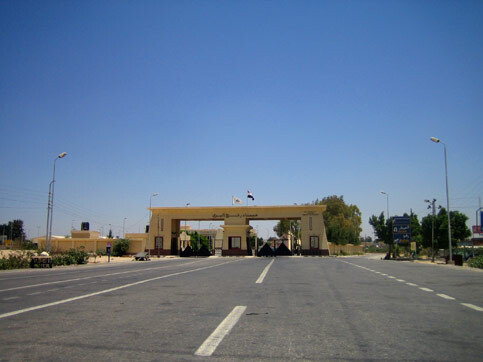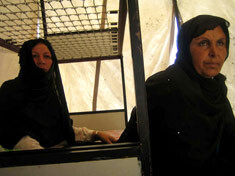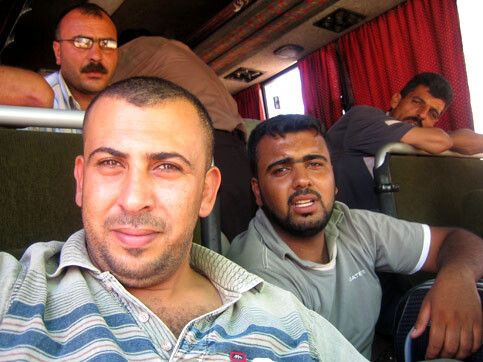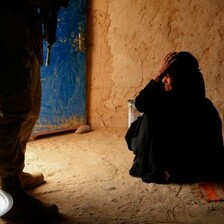The Electronic Intifada 1 August 2007

The empty Rafah terminal on the Egyptian-Gazan border.
Seven weeks into their displacement from Gaza, up to 700 of 6,000 stranded Palestinians returned home this week via the Egyptian-Israeli-controlled border crossing at al-Oja, north Sinai. Their return via this terminal, traditionally used for the transportation of goods into Israel, is described as a one-time-only solution designed to solve the immediate crisis. The plan was forged by Israel and the Palestinian Authority (PA), with the approval of the Egyptian government. In total, by the third day of the repatriation process, 1,627 Palestinians had received approval to return home following a registration procedure stipulated by Israel, the PA and Egypt.
But already there is speculation as to the effectiveness, and indeed the actual intentions of the plan. Such speculation is only heightened because “repatriation for those whose names have not yet been approved is going to prove more difficult,” said Maj. Gen. Salaheddine Selim, an Egyptian expert in military and strategic affairs. Selim admitted that Egypt is unable to determine just when the total displaced population will be able to return to Gaza.
The ongoing crisis at the Egypt-Gaza border began 9 June when Israel imposed the closure of the Rafah terminal, ostensibly the Gaza Strip’s only land gateway to the outside world beyond total Israeli physical control. The majority of the displaced had temporarily left Gaza for purposes of study, medical treatment or travel, to visit relatives or to embark on ‘Umra, the lesser religious pilgrimage to Mecca. Demands to repatriate the stranded have been made by the Palestinians themselves, Hamas, Egypt and international organizations including the United Nations and the International Committee of the Red Cross.
Forced into their current situation, over the past seven weeks the Palestinians have sought refuge in private homes of Bedouins and Palestinian residents in north Sinai, booked hotel rooms where owners have been philanthropic enough not to demand immediate payment, beneath the shade of trees in the desert, mosques, schools and tents in a transformed youth camp in al-Arish.
Ever since the Rafah terminal closure, the mood of the Palestinian displaced grew steadily more desperate. For its part, notorious for its heavy-handedness, Egyptian State Security played a grim role, particularly during the first weeks of the crisis, whereby its personnel worked hard to ensure the invisibility of the Palestinian displaced from the public eye. On the whole, humanitarian assistance to the displaced has been bare. Only the Muslim Brotherhood-dominated Egyptian Doctors’ Syndicate and, later into the crisis, the Egyptian Red Crescent Society played a role of any material significance.
Now, even some of those fortunate enough to have had their names approved have expressed suspicion of a plan that involves them coming under direct Israeli scrutiny. “I am very happy to be going home, of course,” said Zaid (last name undisclosed), as he made ready to enter the al-Oja terminal on a bus that would drop him and his co-passengers off in time to be searched by Israeli border guards. “At the same time, I am worried about what the Israelis will do to us on the other side. I am also worried that Rafah won’t be reopened anytime soon.”

Stranded in Egypt, Abu Hassan from Gaza is bitter that there has been so little assistance provided to the displaced, and that the repatriation process has so far been so biased to the PA.

Many Palestinian women, including these two suffering health problems which they initially came to Egypt to treat, remain stranded in Rafah.
There were fears of re-entry via an Israeli-controlled crossing that Israel might utilize as an opportunity to make arrests. But Selim insisted that Egypt will prevent the re-entry of those with a known history of resistance, or Cairo could be seen as a collaborator with Israel. “Those who are wanted by Israel are going to remain in Egypt until the treaty governing Rafah is renewed and the terminal is reopened,” he said.
But according to one former resistance fighter, who refused to reveal either his name or his organization, the number of those with a history of fighting currently in Egypt is actually low. The main cause for concern, he said, was the fact that there appears to be no coordination to ensure that those with humanitarian needs be repatriated first. “If the use of the terminal at al-Oja is meant to be exceptional in light of a humanitarian crisis, then why is it that most of the sick and the elderly are still in Egypt? And why has there been no coordination to see to it that families are repatriated together?” he said.
Sheikh Abdel Sater al-Ghalban, a Palestinian longtime resident of Egyptian Rafah who has provided up to 100 Palestinians with refuge in his home, concurred. “There are those who were staying here who have been allowed to return to Gaza,” he said. “But the majority is still here. There are many people with diseases, who originally came for treatment and whose condition only grew worse over the course of the closure. Those who have been included on the approval lists are people with connections with the PA.” Indeed, Palestinians seeking shelter at al-Ghalban’s home said the process has thus far proven to be so dysfunctional that, in some cases, parents have been granted approval without their children.
Given that the humanitarian crisis remains far from resolved, Palestinians stranded in north Sinai suspect that the repatriation process was never meant to prioritize the resolving of their needs at all.
For its part, the Egyptian regime — traditionally hostile to the permanent resettlement of refugees on its territory — communicated an ultimatum last week to Israel that it allow for the return of the displaced to Gaza, or Egypt would unilaterally open the border. With the creation of the al-Oja solution, ostensibly Egypt’s principal demand has begun to be met — without Israel or Fatah compromising their refusal to have Rafah reopened, and without resistance parties Islamic Jihad and Hamas in Gaza having their rejection of repatriation via the Kerem Abu Salem crossing bypassed. Still, Egypt, Hamas and the Palestinians are demanding that Rafah — not Al-Oja or Kerem Abu Salem — be reinstated as the de facto border crossing between Gaza and Egypt.
In addition, Cairo is seeking that it be considered an equal partner in a renewed agreement governing the border, rather than a monitor. This correlates directly, according to Selim, with an intended shift in Egyptian policy on Palestine, consequent to revelations by Hamas that the resigned PA security head Mohammed Dahlan was directly involved in the infamous attacks on tourist sites in the Sinai Peninsula, starting with the attack on Taba in October 2004.
Following Taba, both Sharm al-Sheikh and Dahab suffered deadly attacks, leading to massive arrest campaigns by Egyptian State Security, mostly targeting Bedouins. Ever since the bombings, however, there has been suspicion among Egyptian political commentators and security sources about the incrimination of Bedouins, and even speculation that Israel masterminded the attacks. For instance, in October 2004 Al-Ahram Weekly’s Amira Howeidy wrote that Major General Fouad Allam, a former head of the State Security Apparatus, “believes Israel is ‘connected somehow.’”
Indeed, the question of just how Israel was involved was at least partially resolved when Hamas handed over to the Egyptian authorities documents linking Dahlan — who was widely known for his collaboration with the Israeli intelligence apparatus — to the bombings, as reported by the Egyptian media and confirmed by Selim. “The revelations created a need for a reassessment of just who is guilty and who is innocent of terrorism,” the military expert said.
Seen in this light, the refusal by Egyptian President Hosni Mubarak — a peace partner with Israel since 1979 and a key regional ally of the United States — to adopt Palestinian President Mahmoud Abbas’ line that Hamas was allowing al-Qaeda to infiltrate Gaza, is easy to understand. “In light of these realizations, Egypt is readjusting its political and strategic role in the Middle East,” Selim said. He added that, like Hamas, Egypt is adamant in its rejection of an international — or Israeli — presence in Gaza.
But to what extent is Egypt’s current position shifting towards genuine support of the Palestinian cause? More can be learned from recent events in the Arab world’s most populous country, one whose regime has strong political interests in Gaza.
The state is currently set to demolish thousands of homes along the 13-kilometer stretch that is the Egypt-Gaza border and thus clear the area for an increased military presence. The plan, the authorities say, is intended to allow for Egyptian border guards to better secure the area, in a bid to put an end to smuggling and infiltration.

Gazans waiting on the bus on the way into the al-Oja terminal. Palestinians say they are happy to go home but fear that they will be further denied a sovereign crossing.
While tunnels have been proven to exist — border guards say they have found 138 since Israel withdrew from Gaza in 2005 — there is speculation as to what effects Egypt’s clampdown on the area will have on Palestine. Most significantly, the tunnels are believed to be a vital conduit for Hamas and Islamic Jihad, that it is via these tunnels that weapons and money is supplied to them.
But Bedouin residents of Egyptian Rafah, engaged in violent clashes with Egyptian police 30 July leading to the death of one protester against the demolition plans, think otherwise. “Some Bedouin, for lack of any other opportunities to make money, use the tunnels to export goods into Gaza, such as cheap cigarettes,” said one local resident on condition of anonymity. “This plan to have our homes demolished goes hand in hand with Israeli plans to have the area cleared completely, to change the nature of the territory. And Egypt is simply implementing what Israel and the US tell it to do.”
Meanwhile, in spite of a threatened US congressional military aid cut of $200 million for 2008 should border security — along with human rights — fail to improve, Egypt was separately promised new military pacts with the US for a total value amounting to $13 billion over the next 10 years. Understood to be a part of the US’ apparent campaign to build pressure against Iran, the arms sales come at an interesting juncture, as they seem to work on an assumption that Egypt will indeed assist in the US’ and its ally Israel’s campaign to strangle Hamas in Gaza. Modified or not, Egypt’s position in the regional puzzle is unlikely to change dramatically with regards to resistance. “This is because the regime knows full well that, should it support a resistance in Palestine, by default it will be empowering the Muslim Brotherhood here in Egypt,” said Egyptian political and human rights activist Wagdi Abdel Aziz.
As for Hamas, it has so far held steadfast to a position of restraint on the border crisis. At various points in the past weeks, there has been talk of a potential storming by Hamas supporters of the border, to allow, by force, the stranded Palestinians to return home. “The leadership has made sure to keep a tight lid on any such attempts,” said al-Ghalban in Egyptian Rafah, who is in contact with Hamas operatives in Gaza. “They don’t want to be perceived to be participants in any part of this crisis creation.”
At this stage though, what is clear is that no amount of power-playing will lead to the creation of a genuinely sovereign border crossing in and out of Gaza for the Palestinians, and this is something the Palestinians stranded at Egyptian Rafah understand. “We can have no government, only seats filled with empty power, used to improve the lives of Israel’s favourites,” said Ilham al-Firani, who is also staying at the home of al-Ghalban. “Just look at us now if you don’t believe me!”
It appears that Israel and its allies are hoping not only that the ongoing siege of a massively impoverished Gaza Strip will lead to popular pressure against Hamas, but that, if indeed the tunnels are used by the resistance, the material opportunity for fighting Israel from there will be completely nullified by a physical lock-down of non-conventional methods of entry and exit.
This realization did little to bring down the confidence in the Palestinian cause, however. “They can try as hard as they can; there will always be a resistance,” said the fighter cited earlier. “It is natural. What we Palestinians need to do, however, is think strategically, and ensure that our resistance is not trapped in parties. If we are serious about Palestinian independence, then we need to take example from the Iraqi resistance, which has proven itself to be so unique in its strength and purpose that, against all the odds, it has already lost the US its war.”
Serene Assir is a Beirut and Cairo-based independent journalist and blogger.
All images copyright Serene Assir.
Related Links





